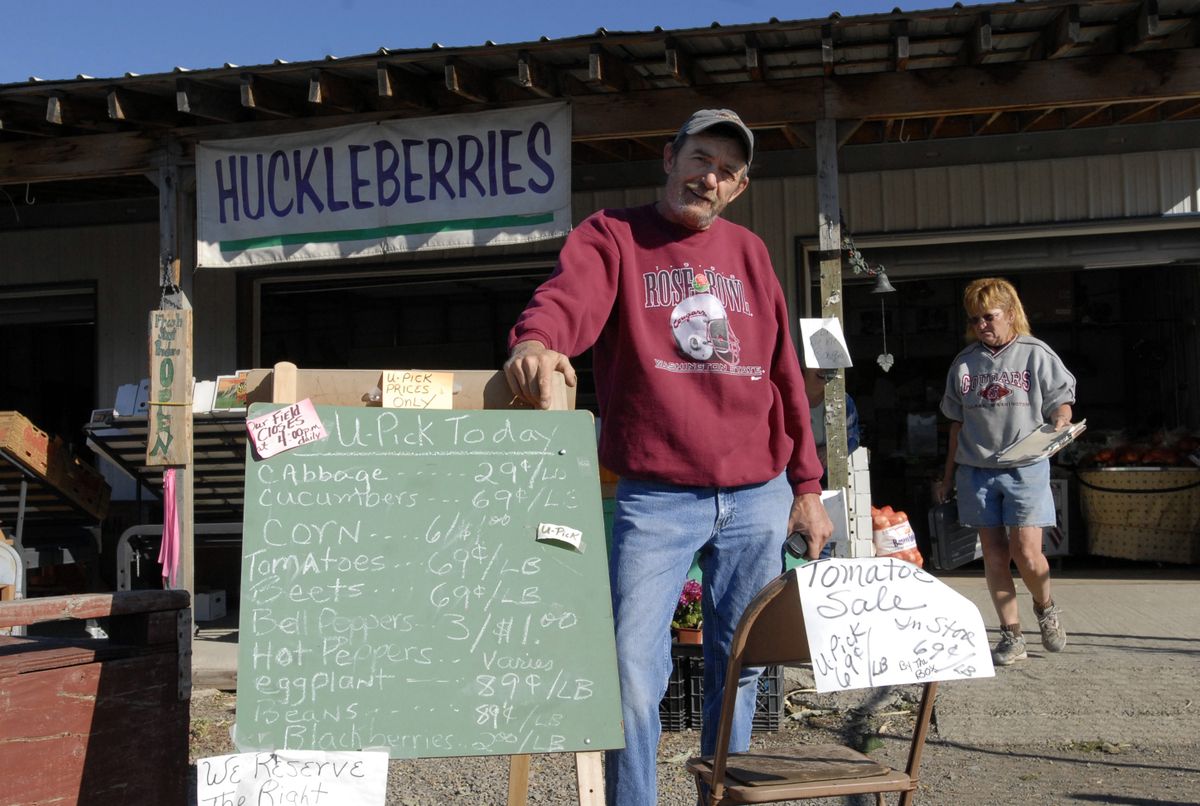Family’s roots run deep
For the growers behind Fresh Start Produce, the hits keep coming: Illness. Aphids. Skyrocketing costs. Friends and customers have stepped in to keep the farm afloat.

Dave Kinyon is a farmer. “Last night I went out in the pumpkin crop at sunset and the glow they give out … I mean, that to me is kinda hard to beat,” he says, leaning on a wooden crate of green peppers.
“It’s kind of like the wheat farms on the Palouse. When the wheat starts waving, it’s a good feeling.”
Kinyon, 60, spent his childhood driving tractors and picking potatoes on his family’s farm in Genesee, Idaho.
“To be honest, when I was real young, I always wanted to be a farmer … and here I am,” he said.
Kinyon, his wife, Lisa, and their family have farmed and operated the Fresh Start Produce stand in Otis Orchards for 28 years. Like everyone else, the Kinyons are seeing their expenses skyrocket. Add to this Kinyon’s six-year battle with multiple sclerosis, and the community institution is facing an uncertain future.
“This is probably the worst year we’ve had (for crops),” Kinyon said.
The tomatoes got a fungus. Aphids infested the corn.
“Just about the time we thought we had that handled, the birds came in and ate about 25 percent of our corn,” he said.
Aside from bad weather – “I don’t know where the summer went, I never saw it” – the farm was hit hard by rising fertilizer prices.
“It started at $700 a ton and I ended up paying $1,400 a ton,” he said.
He’s also struggled to find good labor to help him tend to his 140 varieties of vegetables.
Kinyon credits loyal friends and customers for helping the stand stay afloat.
The stand has one paid employee. The rest are contract workers or volunteers. Longtime customer Robin Cunningham offered Lisa Kinyon her help two years ago.
“I get paid in corn,” she said, chuckling. “It’s a fun retirement job.”
Lisa Kinyon, Cunningham and another female employee hoist and move 50-pound bags of onions like empty sacks.
“What Lisa has at the food stand is damn good help,” Kinyon said. “These ladies here, you don’t see them slowing down much.”
Although he used to easily work 16-hour days, MS has limited how much Kinyon can do on the 80-acre farm. Kinyon’s son, Chris, works full time at the farm, as does his grandson, Christopher, 12.
“He goes out and picks corn for four hours in the morning then goes in and plays video games. But when he’s out there, he’s working,” Kinyon said.
His granddaughters sell the family’s produce at the Liberty Lake Farmers Market. The corn sold at this week’s Spokane County Interstate Fair also came from the Kinyons’ farm.
Earlier this week, a customer in a button-down dress shirt, slacks and shiny leather boots walked up to the stand with two buckets of bi-color corn. He drove from Cheney to explore the U-pick fields.
“I was having so much fun. I’m glad I didn’t take more buckets,” he said to Cunningham before eyeing a table of unfortunate-looking tomatoes.
“They taste good,” Cunningham told the customer, but they’re “dang ugly.”
The U-pick fields are a popular but risky operation. People have driven through the fields and destroyed pipes, or picked crops, stashed them and returned after-hours to steal them.
“You gotta be trusting,” Cunningham said. “You just hope people are honest.”
Aside from theft, loss is the inherent consequence of selling food with a short life span. But the Kinyons don’t let their produce go to waste. They give to Meals on Wheels, food banks or compost piles or sell their produce at cost to local businesses.
“It’s good for me to know that I can help people out,” Kinyon said.
The couple don’t spend money on themselves, Cunningham said. They drive beat-up cars and trade produce with doctors for their glasses or chiropractic services, she said.
For now, the stand remains open. But Cunningham is worried about next year.
The stand isn’t busy like in past years. At 2:30 p.m., there was one customer, she said.
“You gotta sell a lot of stuff to make a profit,” she said. “I didn’t have a clue how expensive it is to run a farm.”
Seed alone costs $10,000 to $15,000 annually.
“It takes them all summer to catch up on paying their bills,” Cunningham said.
The couple then rely on fall crops, such as pumpkin and squash, to get them through the winter. The stand is closed from Halloween to late April. “This community would be lost without them,” Cunningham said.
“And I don’t know what (the family) would do … they could end up in the hole at the end of the year. It scares me for them.”